North Korea crisis: Why now, what happened, what next?
- Published
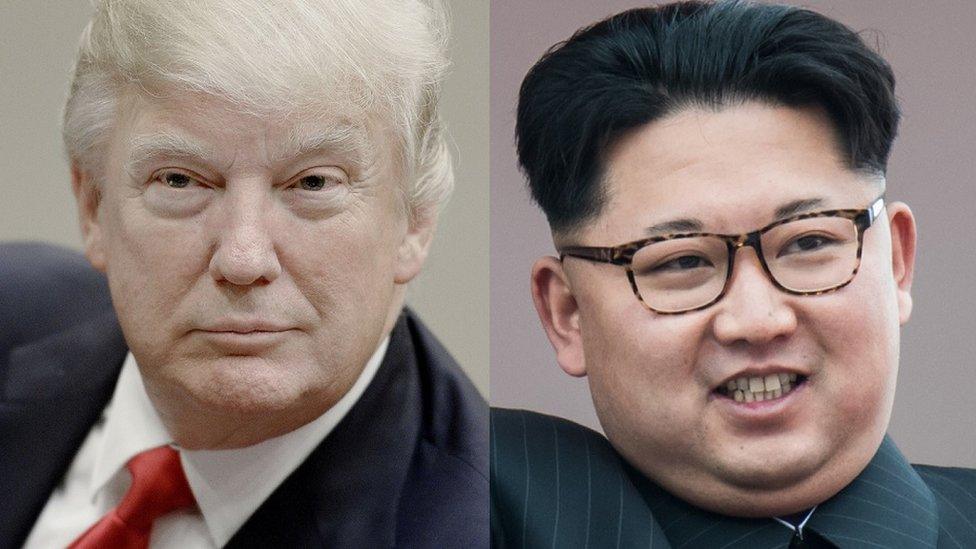
Donald Trump and Kim Jong-Un
Tensions are continuing to rise between the United States and North Korea.
The Trump administration says it will tighten economic sanctions against the government in Pyongyang and activate a missile defence system as it aims to halt Kim Jong-Un's nuclear weapons programme and ballistic missile tests.
North Korea has vowed to conduct more missile and nuclear tests.
The BBC's defence and diplomatic correspondent Jonathan Marcus answers your questions on the situation.

What further impact could tightening sanctions against North Korea hope to achieve?
While there are widespread sanctions against North Korea, they are not effectively enforced. A recent UN study found that fragments from a North Korean missile test showed electronics sourced either from or via Chinese enterprises. So China could do a lot more to enforce missile specific sanctions as well as turning the screw economically.
US steps up pressure on North Korea
The problem for Beijing is that it does not want to see the regime collapse. But the existing sanctions regime could be toughened up and there are various additional financial steps that could be taken to make North Korea's life even more difficult.
The problem is that wider sanctions can be a blunt instrument and with frequent famines in the country, nobody wants to make the suffering of ordinary North Koreans even worse.

North Korea and China have proposed a possible end to Pyongyang's nuclear development if the US stops threatening manoeuvres on the country's border. Why isn't this pursued?
The goal of US policy has long been to roll back North Korea's nuclear programme, but that has proved impossible and the emphasis seems increasingly upon containment. There is no evidence that North Korea has any desire to give up its nuclear weapons, indeed quite the contrary. It believes they are the most important factor preventing their country from being swept away.
North Korea's missile programme
China is of course eager to find a diplomatic way forward and there are avenues that could be explored - North Korean limitations on its weapons programme, for example, in return for various concessions. But this has been tried before and it failed. This is an almost unique regime in its level of isolation, paranoia and fundamental weakness, whatever its apparent military strength.

What treaties are in place around the Korean peninsula, is anyone obliged to join them and is anyone obliged to respond?
South Korea has a long-standing mutual defence treaty (1953) with the United States, and Washington would come to its aid if it was threatened. There are some 28,500 US troops in South Korea and advanced US warplanes rotate through the country on regular deployments.
There is also the Sino-North Korean Mutual Aid and Co-operation Friendship Treaty of 1961, which has some defence elements, but it is far from clear that China would go to war to defend the North Korean regime, especially if it had instigated hostilities against the South.

What chances of defending herself does North Korea have in case of an attack from the US and allied countries, following another nuclear test?
I would stress at the outset that we are (hopefully) still far away from a full-scale military engagement. Given the North Korean military's capabilities and readiness, any war, if it did break out, is likely to lead to devastating consequences for South Korea. Seoul, the South Korean capital, is well within range of massed North Korean artillery.
The kind of forces that the US has so far sent to the region - a carrier strike group and a submarine equipped with cruise missiles - sends a signal but is far from adequate for the Americans to contemplate hostilities.
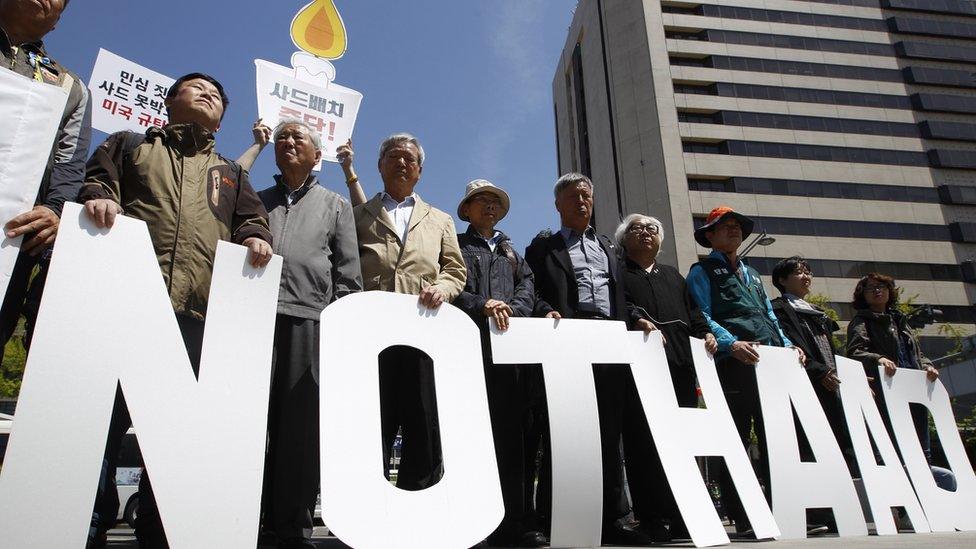
There have been protests in South Korea against US defence policy
Obviously, while North Korea might have an initial military advantage, any full-scale war would see it facing the technological sophistication of the modern US military machine. North Korea would almost certainly lose. But the level of devastation in both North and South Korea would be immense and that is without considering the possibility that Pyongyang might seek to use its small nuclear arsenal.
If the Thaad missile system successfully intercepts a nuclear warhead, what happens to the fissile material in that warhead?
It is by no means clear that North Korea has nuclear warheads small enough to go on its missiles. Thaad is designed to intercept missiles during the terminal phase of their flight, inside or just outside the earth's atmosphere at a range of some 200 km, which experts believe would mitigate the effect of any weapon of mass destruction like nuclear or chemical.

How good is Thaad? If it takes the sting out of North Korea's missiles, does it make a ground war more likely?
Thaad is an impressive system but not a missile-proof shield. Its deployment is both a diplomatic signal and a practical precaution. It could, for example, try to intercept any errant North Korean missile that might be heading for South Korea.
Are North Korea's neighbours worried about an attack?
It is still not clear when the Thaad system and its powerful radars will actually be operational, though the deployment has begun.

If North Korea sinks a US ship and the US retaliates, what is the chance of China becoming involved and does this mean global nuclear war?
China is well aware of the escalating tensions in the region and is clearly eager to dial back the crisis.
The US in turn is seeking to use Beijing's concern as a lever to get it to try to influence Pyongyang's behaviour.
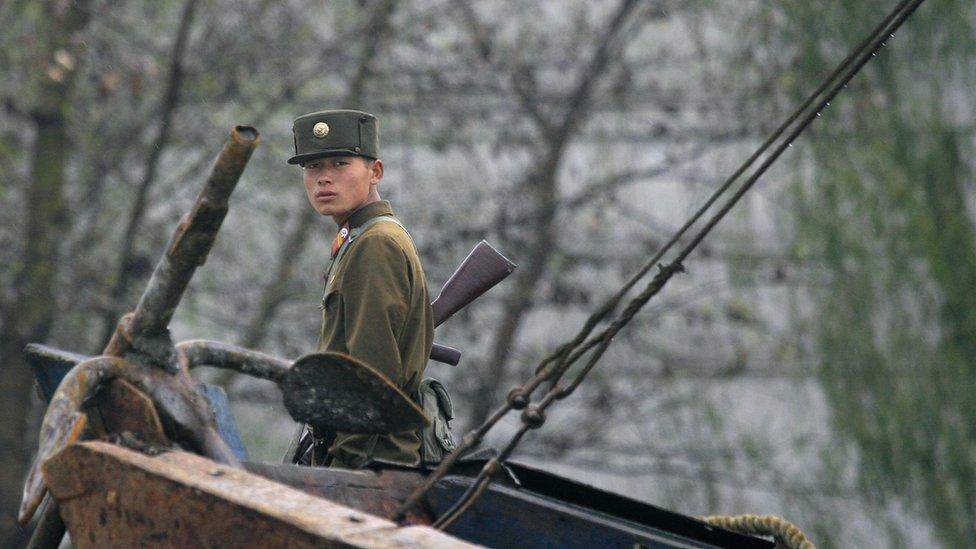
China and North Korea share a border between Dandong and Sinuiju provinces, respectively
China is in a difficult position. It does not much like the Pyongyang regime and its unstable behaviour. But it does not want to see the regime swept away, partly because it does not relish a US-leaning unified Korea on its border, but also because the collapse of the North Korean regime might lead to a huge wave of millions of refugees seeking sanctuary in China.
During the last Korean conflict in the 1950s, China was an active participant on the side of the North Koreans but there is no indication that it would back the erratic regime in Pyongyang in any future conflict.

If North Korea was to launch a nuclear attack on South Korea and the US, how would that impact on places like Europe?
While North Korea is believed to have a small but significant arsenal of nuclear weapons, it is by no means clear that it has mastered the ability to reduce a warhead sufficiently in size to place it on the end of a missile.
The bulk of its missile force is armed with conventional warheads and could easily create havoc in South Korea, perhaps even reaching US bases in Guam. It does not yet have intercontinental range weapons with which it could strike the continental United States. It is seeking to develop such a capability and this is precisely what successive US administrations have sought to prevent - so far with little apparent success.
How mixed signals on North Korea could spell disaster
Clearly, North Korea is a very long way from Europe and its weapons do not have sufficient range to reach European targets. Quite what impact a nuclear release would have more generally (on the environment and so on) is hard to say. Much would depend upon its scale, atmospheric conditions and so on.
Perhaps the most significant consequence of the use of a nuclear weapon would be the fact that it happened at all - that more than 70 years after the use of atomic weapons by the Americans against Japan in World War Two, another country had recourse to these weapons. The wider diplomatic ramifications would be considerable.

Is the UK capable of defending an attack by North Korea following the 2010 and 2015 Strategic Defence and Security Review, which left the Royal Naval Force capabilities depleted?
North Korea has no obvious reason or capability to attack the UK. It is a very long way away and although Britain is a close ally of the United States, we do not have a prominent voice in policy towards North Korea.
That said, if there were to be another conflict on the Korean peninsula the US might seek support from its allies. Remember the last Korean War was actually waged by an alliance of the United Nations with Washington at its head.
Britain has sought to play up its reliability as a military partner of the US, but it is hard to see what capability we might provide to the region and quickly - if a conflict did break out.

How much does the average North Korean know about how the US is stepping up its defences against them?
North Korea is a largely closed state where people know what the government chooses to tell them. The North Korean narrative is one of an embattled country surrounded by enemies brandishing nuclear weapons. Thus Pyongyang's response is to seek such weapons themselves and to have a highly militarised society.
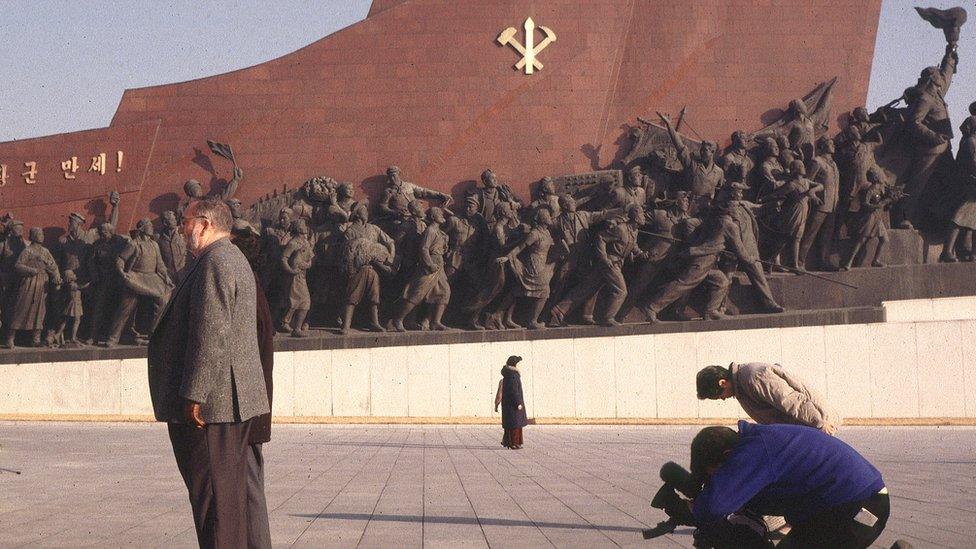
'North Korea is a largely closed State where people know what the Government chooses to tell them'
The level of rhetoric coming out of North Korea sometimes sounds like parody. But they do see themselves as under threat. They are probably the most isolated country in the world with few friends.
This is a regime that, while it can build missiles, can sometimes barely feed its people. Any long-term solution to the problem of North Korea has to engage to some extent with their narrative and find ways of reassuring them that the outside world is not solely bent on taking down their regime.
Clarity in US policy is the key thing as well as a willingness to try to find inducements to open up some kind of diplomatic dialogue with Pyongyang, while equally sending a tough message of deterrence. South Korea is under far more threat of a deliberate attack from the North than the other way around.
Produced by Nana Prempeh, UGC & Social News Hub

Other times BBC correspondents have answered your questions:
- Published27 April 2017
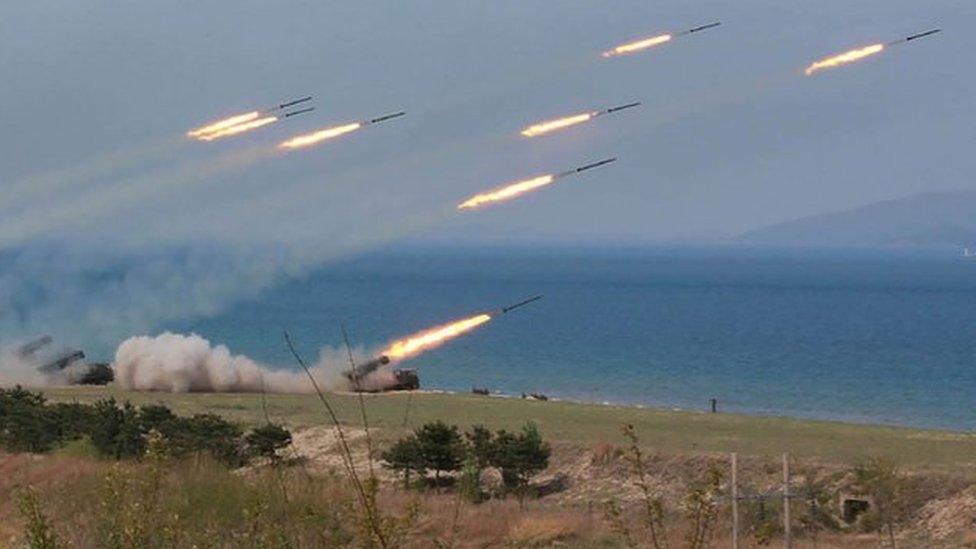
- Published26 April 2017
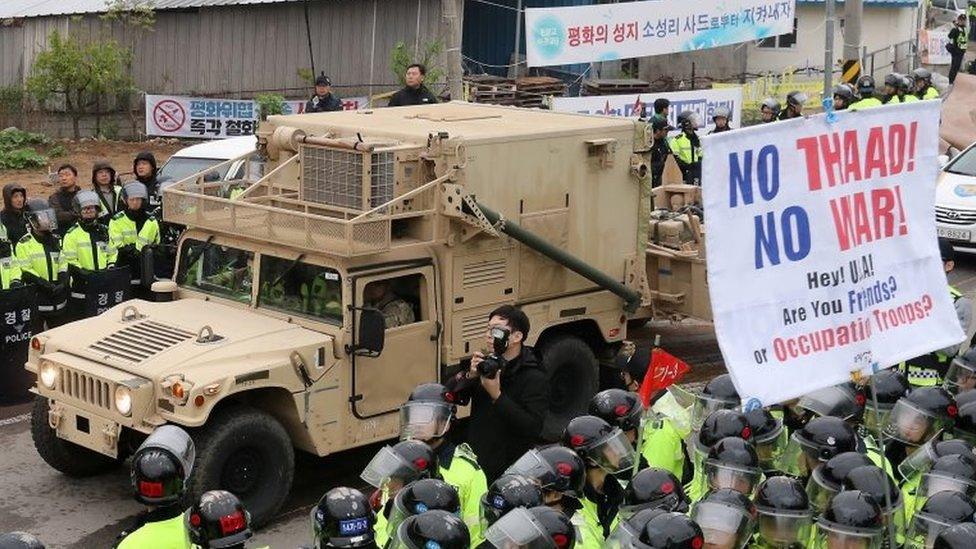
- Published10 August 2017